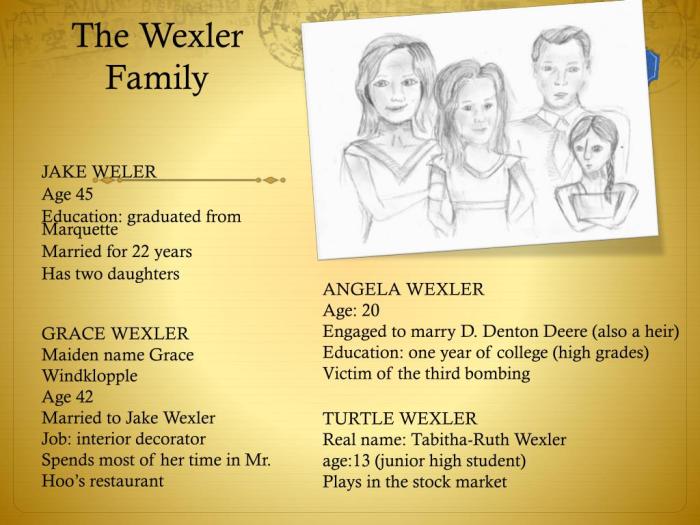The westing game jake wexler – In Ellen Raskin’s captivating novel, The Westing Game, Jake Wexler embarks on an extraordinary quest that tests his wits, challenges his loyalties, and ultimately transforms his life. Join us as we delve into Jake’s intricate character, unravel the novel’s rich symbolism, and explore the profound themes that lie at its heart.
The Westing Game is a literary masterpiece that invites readers to solve a puzzling mystery while reflecting on the complexities of human nature and the search for belonging.
Character Analysis of Jake Wexler

Jake Wexler, the endearing protagonist of “The Westing Game,” is a complex and multifaceted character. His motivations and goals, his relationships with other characters, and his role in the game itself shape his development and make him a compelling figure.
Motivations and Goals
Jake’s primary motivation is to find his father, who abandoned him and his mother when he was a child. This search for his father drives him to participate in the Westing Game, as he believes it may hold clues to his whereabouts.
Jake Wexler, the young protagonist of The Westing Game, embarks on a thrilling adventure to solve the enigmatic puzzle left behind by eccentric millionaire Samuel W. Westing. Along the way, he learns about the remarkable contributions of forgotten figures, such as the fascinating story of how Abuela invented the zero . This discovery further inspires Jake to embrace the power of curiosity and perseverance in his quest to unravel the secrets of the Westing Game.
Relationships with Other Characters
Jake forms various relationships throughout the game, each of which influences his character. His friendship with Alice Westing, the eccentric millionaire who created the game, provides him with guidance and support. His rivalry with Chris Theodorakis, a fellow contestant, fuels his determination and competitiveness.
Role in the Westing Game
Jake’s role in the Westing Game is pivotal. As a contestant, he is tasked with solving the puzzles and riddles left by Alice Westing. Through this process, he develops his critical thinking skills, problem-solving abilities, and resilience. The game also exposes him to a diverse group of individuals, each with their own unique motivations and secrets.
Symbolism and Motifs in the Westing Game: The Westing Game Jake Wexler

The Westing Game is replete with recurring symbols and motifs that contribute significantly to the novel’s overall meaning. These elements enhance characterization, drive plot development, and provide deeper insights into the themes explored.
The Westing Game Itself, The westing game jake wexler
The game serves as a central symbol, representing both the mystery that drives the plot and the transformative journey undertaken by the characters. The game’s rules, with their emphasis on teamwork, cooperation, and the pursuit of truth, reflect the novel’s themes of community and self-discovery.
The Jigsaw Puzzle
The jigsaw puzzle, assembled by the heirs, symbolizes the fragmented nature of the Westing family and the mystery surrounding their deaths. As the pieces are gradually put together, the characters uncover the truth about their past and the secrets that have haunted them.
The Four Seasons
The novel’s four parts are named after the seasons, which symbolize the cyclical nature of life and the passage of time. Each season brings new challenges and revelations, mirroring the characters’ growth and transformation throughout the game.
The Bomb
The bomb threat serves as a constant reminder of the stakes involved in the game. It represents the potential for destruction and chaos, but also the opportunity for redemption and reconciliation. The characters’ choices ultimately determine the outcome, highlighting the consequences of their actions.
Light and Darkness
Throughout the novel, light and darkness are juxtaposed to symbolize the struggle between good and evil. The characters navigate a world where truth and deception are intertwined, and their choices shape the ultimate balance between these opposing forces.
Themes and Literary Devices

The Westing Game explores several major themes, including:
The importance of cooperation
The Westing Game forces the heirs to work together to solve the mystery and claim their inheritance. This highlights the value of teamwork and collaboration.
The power of money
The Westing Game is a testament to the power of money. The heirs are all motivated by the desire to win the inheritance, and they are willing to do whatever it takes to get it.
The nature of good and evil
The Westing Game explores the nature of good and evil. The heirs are all flawed characters, and they all have the potential for both good and evil.Ellen Raskin uses a variety of literary devices to convey these themes, including:
Foreshadowing
Raskin uses foreshadowing to hint at the events that will happen later in the novel. For example, the opening chapter describes the heirs receiving their invitations to the Westing Game, and it mentions that one of them will be killed.
This foreshadows the murder of Sam Westing.
Irony
Raskin uses irony to create suspense and humor. For example, the heirs are all initially suspicious of each other, but they eventually learn to work together. This is ironic because it shows that the people who are most likely to betray each other are also the most likely to help each other.
Cultural and Historical Context

The Westing Game was written during a time of significant social and cultural change in the United States. The 1960s and 1970s were marked by the Civil Rights Movement, the Vietnam War, and the rise of the counterculture.
The novel reflects these social and cultural values in its depiction of the characters and their interactions. The characters come from a variety of backgrounds and have different experiences, and the novel explores the ways in which these differences affect their relationships with each other.
The Setting and Time Period
The Westing Game is set in the fictional town of Sunset Towers, Connecticut, in the early 1970s. The town is a microcosm of the United States at that time, with a diverse population and a range of social and economic problems.
The time period of the novel is also significant. The early 1970s was a time of great social and political unrest in the United States. The Vietnam War was still raging, and the Watergate scandal was about to break. These events had a profound impact on the characters in the novel, and they helped to shape the story’s plot.
FAQ Section
Who is Jake Wexler?
Jake Wexler is a resourceful and determined 13-year-old boy who plays a central role in The Westing Game.
What is the Westing Game?
The Westing Game is a mysterious contest created by the eccentric millionaire, Samuel W. Westing, where 16 unlikely heirs compete to inherit his vast fortune.
What are the major themes explored in The Westing Game?
The Westing Game explores themes of identity, friendship, loyalty, and the search for meaning in life.
